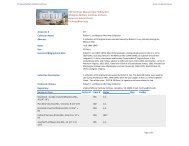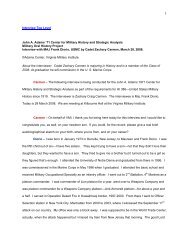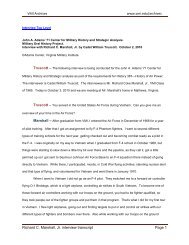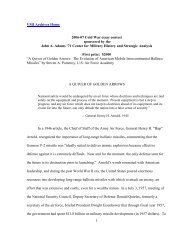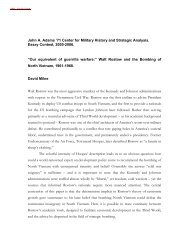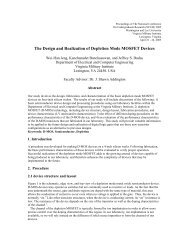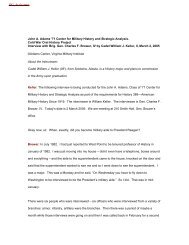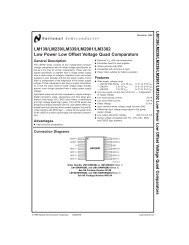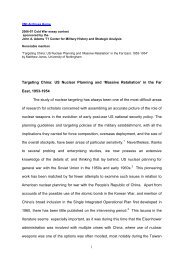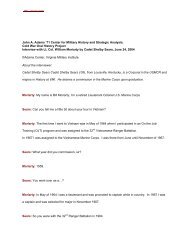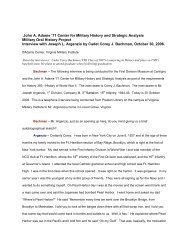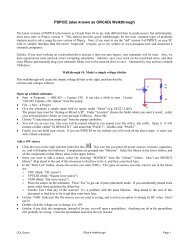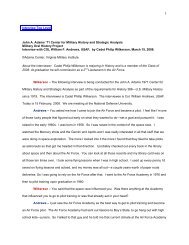Academic Catalog - Virginia Military Institute Admissions
Academic Catalog - Virginia Military Institute Admissions
Academic Catalog - Virginia Military Institute Admissions
You also want an ePaper? Increase the reach of your titles
YUMPU automatically turns print PDFs into web optimized ePapers that Google loves.
<strong>Virginia</strong> <strong>Military</strong> <strong>Institute</strong><br />
12-13 <strong>Catalog</strong>ue<br />
modeling, safety modeling, design trade-off analysis, and the testing of redundant digital<br />
systems will be covered. Prerequisites: MA 220, EE 339.<br />
EE 445. COMPUTER NETWORKS 2—2—3<br />
Introduction to computer network fundamentals such as network architecture and Media<br />
Access Control (MAC). The topics covered include: ALOHA networks, Carrier Sense Multiple<br />
Access (CSMA) networks, CSMA Collision Avoidance (CSMA/CA) networks, CSMA with<br />
collision detection (CSMA/CD) networks, token passing networks, Ethernet networks, seven<br />
layer OSI model, IEEE network standards, wireless networks to include satellite networks,<br />
network media selection, and the fundamental components of the Internet. The ability to design<br />
a network to meet a throughput requirement is stressed. Prerequisites: MA 220, EE 372W.<br />
EE 450. BIOMEDICAL SIGNAL PROCESSING AND BIOMECHANICS 2—2—3<br />
This laboratory-intensive course is divided into modules covering two of the largest branches<br />
of bioengineering: biosignal processing and the mechanical analysis of biostructures. The first<br />
module introduces the Short-Time Fourier Transform and its application to speech processing<br />
and synthesis. The two-dimensional Z-Transform and its application to filter and enhance<br />
medical images are also covered. The second module has a brief treatment of statics and<br />
continuum mechanics, then introduces three-dimensional solid modeling techniques, and<br />
ties these together with the use of finite element solvers. Prerequisite: EE 431.<br />
EE 455. ELECTRICAL/MECHANICAL DESIGN 2—2—3<br />
Engineering in practice often employs a hybrid of electrical and mechanical design<br />
skills. This laboratory-intensive course takes students already proficient in analog design<br />
and microcontroller programming, and in the first module ties these skills together with<br />
microcontroller analog interfacing methods. The second module consists of a brief treatment<br />
of statics and continuum mechanics, and then introduces three-dimensional solid modeling,<br />
additive rapid prototyping, and stress analysis techniques. Students then demonstrate mastery<br />
of electrical and mechanical design skills in the third module design project. Laboratory<br />
experiments involving microcontroller interfacing and computer-aided design complement<br />
the lectures. Prerequisites: EE 223, EE 339, PY 161.<br />
EE 460. PORTABLE POWER 2—2—3<br />
Microelectronics has enabled sophisticated electrically powered communications, sensing/<br />
data acquisition, computing, entertainment and positioning systems that are portable. A<br />
major challenge is the lifetime, weight, reliability and resupply of the batteries powering<br />
these systems. This course examines high-energy-density solutions capable of meeting<br />
these enhanced requirements. A laboratory session examines systems efficiencies, energy<br />
conversion/storage methods, high efficiency converters/regulators and testing metrics applied<br />
as feedback to a systems engineering approach. Prerequisite: EE 356.<br />
EE 469. ECE INTERNSHIP FOR CREDIT 0—0—0 to 0—0—3<br />
Designed for students pursuing an internship for credit in ECE. Students must meet<br />
eligibility, registration, and documentation requirements, as outlined in the VMI <strong>Academic</strong><br />
Regulations.<br />
EE 470. SEMINAR 1—0—1<br />
The senior seminar is designed with the twin goals of preparing students to take the<br />
Fundamentals of Engineering examination, and provide graduating cadets with important<br />
career skills not covered in other courses, including how to interview/negotiate salary, what<br />
graduate school offers an engineering career, the role of professional organizations including<br />
the IEEE, the importance of P.E. licensure, and how to obtain patents. Students will choose<br />
an area from several current fast-hiring branches of electrical engineering, research the field<br />
from the view of a prospective hire, and present their findings in a formal written and power<br />
point presentation to the class.<br />
EE 471W SYSTEM DESIGN VALIDATION 1—0—1<br />
The objective of this course is to validate a system design satisfying requirements defined<br />
by the IEEE Student Hardware Contest rules through a final evaluation occurring as a multiteam<br />
competition. This course applies test and evaluation as feedback to conceptual, logical<br />
and physical design steps of multiple subsystems and the integrated system. A reflective<br />
essay addresses lessons learned from application of a complex systems engineering<br />
process that produces both a product and management processes. Prerequisite: EE 422.<br />
Writing Intensive (W).<br />
EE 473. SELECTED TOPICS IN<br />
ELECTRICAL AND COMPUTER ENGINEERING 3—0—3<br />
Special topics in electrical and computer engineering as suggested by members of the<br />
faculty or cadets. Subject and content announced before the semester begins. Topics will<br />
be determined upon adequate student interest. Prerequisite: Permission of the Instructor.<br />
EE 491-496. UNDERGRADUATE RESEARCH IN ECE 1—0—1 to 0—6—3<br />
Designed for students pursuing undergraduate research under the supervision of one or<br />
more members of the ECE faculty. Approval of the instructor(s) and the ECE Department<br />
Head is required. A final paper and/or presentation will be required at the end of the course,<br />
as deemed appropriate by the instructor(s).<br />
ENGLISH<br />
DEPARTMENT OF ENGLISH AND FINE ARTS<br />
DEPARTMENT Head: ColONEl MillER<br />
Requirements for a major in English are specified on page 55.<br />
Note: A minimum grade of C in WR 101 is a prerequisite for WR 102, and a minimum<br />
grade of C in WR 102 is a prerequisite for all 200- and 300-level English (EN) and Writing<br />
(WR) courses. All 400-level courses have additional prerequisites, which are listed in the<br />
course descriptions. These prerequisites may be waived by the department head if there is<br />
evidence that the cadet is well prepared for the 400-level course.<br />
EN 201. ENGLISH LITERATURE TO 1750 3—0—3<br />
Beginning with the early Anglo-Saxon tale of heroes and monsters, Beowulf, and ending<br />
in the eighteenth century with the satiric adventures of Swift’s Gulliver, this course looks<br />
at the major writers and works of the intervening one thousand years. Writers will include<br />
Chaucer, Shakespeare, and Milton. Emphasis is placed not only on individual works but on<br />
continuity and tradition in the evolution of British literature.<br />
EN 202. ENGLISH LITERATURE SINCE 1750 3—0—3<br />
Romanticism turned away from the past to explore new relationships between human beings<br />
and nature, idealism and experience. Major emphasis will be placed on Blake, Wordsworth,<br />
Coleridge, Byron, Shelley, and Keats. The impact of industry and science on the Victorian<br />
era will be considered in the poetry of Tennyson, Browning, and Arnold, and in Dickens’<br />
novel, Hard Times. Finally, we will explore the diversity and experimentation of the twentieth<br />
century’s poetry, fiction, and drama, including the works of Conrad, Yeats, Woolf, and Eliot.<br />
EN 203. WORLD LITERATURE-THEMATIC FOCUS 3—0—3<br />
This course will introduce students to literature from various world regions and/or cultures<br />
using a thematic focus. The focus will be on both the close study of the literature itself and<br />
the cultural context through which it arose. See the course schedule for specific themes.<br />
This course is not repeatable.<br />
EN 204. WORLD LITERATURE-REGIONAL FOCUS (NOT BRITAIN OR US) 3—0—3<br />
This course will introduce students to literature from a specific region of the world. The<br />
focus will be on both the close study of the literature itself and the cultural context through<br />
which it arose. See the course schedule for specific regional designations. This course is<br />
not repeatable.<br />
EN 209. SURVEY OF AMERICAN LITERATURE 3—0—3<br />
“It’s a complex fate, being an American.” When Henry James wrote these words, he had<br />
in mind certain persistent conflicts in the American mind and imagination. This course is an<br />
introduction to the major writers from the Colonial period to the present who have helped to<br />
define these conflicts and thus to illuminate the complex fate of this country. The course will<br />
consider such things as America’s sense of destiny; the tension between individual rights<br />
and social imperatives; the encounter of black, red, and white on this continent; the role of<br />
the artist in a democratic society; changing perspectives on nature; the old world versus<br />
the new; the American dream; and the American nightmare.<br />
EN 250W SEMINAR IN LITERARY RESEARCH & ANALYSIS 3—0—3<br />
This course is an introduction to literary research and writing. It teaches students how to<br />
conceive and shape research topics, use a wide range of research tools (both in print and<br />
online), and apply a variety of critical theories for reading and analyzing literature. Course<br />
research projects will be both instructor-and student-designed. Writing Intensive (W).<br />
EN 308. RENAISSANCE ENGLISH LITERATURE 3—0—3<br />
A study of English poetry, prose, and drama of the sixteenth and early seventeenth<br />
centuries. Emphasis is on the understanding and appreciation of the works discussed, but<br />
some attention is given to each as an expression of the culture of the period.<br />
EN 310. SHAKESPEARE 3—0—3<br />
A survey of Shakespeare’s works, including selected histories, tragedies, and comedies.<br />
EN 312. EIGHTEENTH-CENTURY BRITISH LITERATURE 3—0—3<br />
The literature of the Restoration and eighteenth century in England (1668-1775); Gulliver’s<br />
Travels, Robinson Crusoe, The Beggar’s Opera, and more.<br />
EN 316. ROMANTIC LITERATURE 3—0—3<br />
A study of poetry and prose of the English Romantic Movement. The nature of the individual,<br />
the connections among individuals, the nature of nature, the effects of technology and the<br />
industrial revolution, and the place and purpose of literature were the concerns of such<br />
poets as Blake, Wordsworth, Coleridge, Keats, Byron, and Shelley, and of the novelists<br />
Walter Scott and Mary Shelley (Frankenstein).<br />
EN 318. VICTORIAN LITERATURE 3—0—3<br />
A study of Victorian thought and spirit through literature. Readings in Bronte, Tennyson,<br />
Browning, Wilde, and others.<br />
EN 320. TWENTIETH-CENTURY BRITISH LITERATURE 3—0—3<br />
A study of major British writers since 1900 including Conrad, Eliot, Yeats, and Graham<br />
Green, among others.<br />
89




